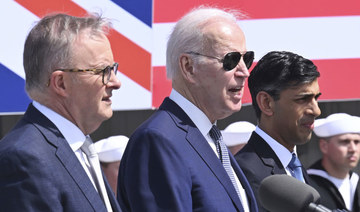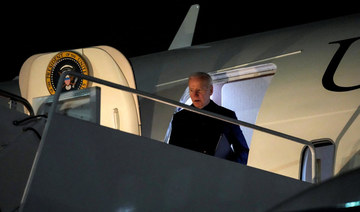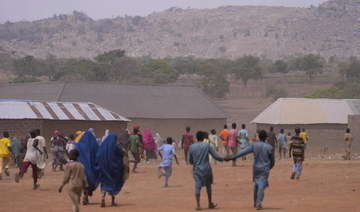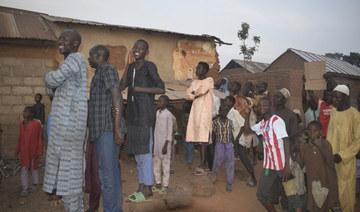SYDNEY: Australia’s Prime Minister Anthony Albanese said he was confident a deal for the US to sell nuclear powered submarines to Australia was on track, ahead of talks between defense and foreign ministers of the two countries on Friday.
Twenty-five US Republican lawmakers told President Joe Biden on Thursday the plan to sell three attack submarines to Australia under the so-called AUKUS partnership would “unacceptably weaken” the US fleet without a clear plan to replace them.
US Secretary of State Antony Blinken and Defense Secretary Lloyd Austin are in Queensland state for the annual AUSMIN dialogue, where progress on the nuclear-powered submarine deal, regional security and clean energy will be the focus.
“I am very confident,” Albanese told reporters on Friday, when asked about the Republican letter, which noted the AUKUS agreement was “vitally important” but shouldn’t weaken the US fleet.
The United States, Britain and Australia announced the three-way AUKUS defense agreement in 2021 under which Australia is to obtain nuclear submarine technology from the United States.
Albanese said he had met Republicans and Democrats on the sidelines of a NATO summit in Lithuania this month and was struck by “their unanimous support for AUKUS.”
The US is Australia’s major security ally and announced with Britain in March that the United States would sell Australia three US Virginia class nuclear powered submarines in the early 2030s, before Britain and Australia produce a new submarine class — SSN-AUKUS — the following decade.
Australian Defense Minister Richard Marles said in a Sky television interview that Australia, which has agreed to invest $3 billion in US submarine facilities, understood there was “pressure on the American industrial base” but AUKUS was “on track.”
“Why this arrangement is going to be so advantageous for all three countries is because we will develop an industrial base in this country which will contribute to the net capability of Australia, the UK and the US,” he added.
China’s security ambitions in the Indo-Pacific will also be under discussion by the security allies over two days of talks.
“We’ve seen troubling (Chinese) coercion from the East China Sea to the South China Sea to right here in the Southwest Pacific, and will continue to support our allies and partners as they defend themselves from bullying behavior,” Austin said before meeting Marles on Friday.
Australia is reshaping its defense force in response to China’s military buildup, and plans to boost its long-range strike capability, domestic missile production, and interoperability with the US and other regional militaries.
Austin said deepening defense ties, including efforts to integrate Japan into joint force posture initiatives, would be discussed.
“Now’s the time to be working closely with friends, and Australia has no better friend than the United States of America,” Marles said at the start of a meeting with his US counterpart.
Australia hosts an annual rotation of US Marines in the northern city of Darwin. War games involving more than 30,000 troops from the US, Japan and 10 other countries are being held in Queensland this week.
Australia says it is ‘confident’ on US nuclear submarines as ministers meet
https://arab.news/mm8fs
Australia says it is ‘confident’ on US nuclear submarines as ministers meet
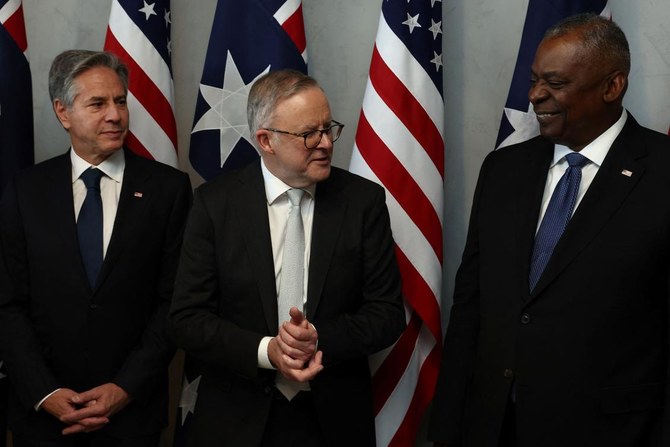
- The US, Britain and Australia announced three-way AUKUS defense agreement in 2021
- Australia will obtain nuclear submarine technology from the United States
Pro-Palestinian protests dwindle to tiny numbers and subtle defiant acts at US college graduations

- Israel has killed nearly 35,000 Palestinians, according to Gaza’s Health Ministry
NEW YORK: A tiny contingent of Duke University graduates opposed pro-Israel comedian Jerry Seinfeld speaking at their commencement in North Carolina Sunday, with about 30 of the 7,000 students leaving their seats and chanting “free Palestine” amid a mix of boos and cheers.
Some waved the red, green, black and white Palestinian flag. Seinfeld, whose namesake sitcom was one of the most popular in US television history, was there to receive an honorary doctorate from the university.
The stand-up turned actor, who stars in the new Netflix movie “Unfrosted,” has publicly supported Israel since it invaded Gaza to dismantle Hamas after the organization attacked the country and killed some 1,200 people in southern Israel on Oct. 7. The ensuing war has killed nearly 35,000 people in Gaza, mostly women and children, according to Gaza’s Health Ministry, which doesn’t distinguish between civilians and combatants.
Students at campuses across the US responded this spring by setting up encampments and calling for their schools to cut ties with Israel and businesses that support it. Students and others on campuses whom law enforcement authorities have identified as outside agitators have taken part in the protests from Columbia University in New York City to UCLA.
A few dozen pro-Palestinian protesters tried to block access to Sunday evening’s commencement for Southern California’s Pomona College. After demonstrators set up an encampment last week on the campus’ ceremony stage, the small liberal arts school moved the event 30 miles (48 km) from Claremont to the Shrine Auditorium in downtown Los Angeles. Tickets were required to attend the event, which the school said would include additional security measures.
In April, police wearing riot gear arrested 19 protesters who had occupied the president’s office at the college with about 1,700 undergraduates. Demonstrator Anwar Mohmed, a 21-year-old Pomona senior, said the school has repeatedly ignored calls to consider divesting its endowment funds from corporations tied to Israel’s war against Hamas in the Gaza Strip.
“We’ve been time and time again ignored by the institution,” Mohmed said outside the Shrine on Sunday. “So today we have to say, it’s not business as usual.”
At the University of California, Berkeley, on Saturday, a small group of pro-Palestinian demonstrators waved flags and chanted during commencement and were escorted to the back of the stadium, according to the San Francisco Chronicle. There were no major counterprotests, but some attendees voiced frustration.
“I feel like they’re ruining it for those of us who paid for tickets and came to show our pride for our graduates,” said Annie Ramos, whose daughter is a student. “There’s a time and a place, and this is not it.”
The small student protest Sunday at Duke’s graduation in Durham, North Carolina, was emblematic of campus events across the US Sunday after weeks of student protests roiled US campuses in recent weeks and resulted in nearly 2,900 arrests at 57 colleges and universities.
This weekend’s commencement events remained largely peaceful.
At Emerson College in Boston, some students took off their graduation robes and left them on stage. Others emblazoned “free Palestine” on their mortar boards. One woman, staring at a camera broadcasting a livestream to the public, unzipped her robe to show a kaffiyeh, the black and white checkered scarf commonly worn by Palestinians, and flashed a watermelon painted on her hand. Both are symbols of solidarity with those living in the occupied territories.
Others displayed messages for a camera situated on stage, but the livestream quickly shifted to a different view, preventing them from being seen for long. Chants during some of the speeches were difficult to decipher.
Protests at Columbia University, where student uprisings inspired others at campuses across the country, led the school to cancel its main graduation ceremony in favor of smaller gatherings.
The University of Southern California told its valedictorian, who publicly backed Palestinians, that she could not deliver her keynote speech at its graduation ceremony because of security concerns. It later canceled its main graduation ceremony.
At Depaul University in Chicago, graduation is more than a month away. But as the academic year closes, school leaders said they had reached an “impasse” with the school’s pro-Palestinian protesters, leaving the future of their encampment on the Chicago campus unclear.
The student-led DePaul Divestment Coalition, which is calling on the university to divest from economic interests tied to Israel, set up the encampment nearly two weeks ago. The group alleged university officials walked away from talks and tried to force students into signing an agreement, according to a student statement late Saturday.
Nigerian troops and village vigilantes rescue kidnapped university students

- Troops aided by local vigilantes rescued the kidnap victims after a shootout with their abductors in Kogi state, says government spokesman
- Kidnapping has become elucrative criminal activity in Nigeria’s northwest, where roving have seize mostly young ones and demand ransom money from their relatives
MAIDUGURI, Nigeria: Nigerian security forces have rescued students kidnapped from a university in northern Kogi state, along with other victims held by the abductors, the army and state government said on Sunday.
Kogi information commissioner Kingsley Femi Fanwo said security forces were involved in a shootout with the armed gang that carried out Thursday’s abduction at Confluence University of Science and Technology.
The state had enlisted the help of local hunters who know the Kogi terrain, and a security agent and hunter were wounded.
The Nigerian army said in a separate statement that troops, other security agencies and local vigilantes were involved in “a fierce firefight” with the kidnappers.
“The superior firepower of the troops led to the kidnappers abandoning nine of the kidnapped students, who were subsequently rescued,” the army said.
Nigeria’s President Bola Tinubu has ruled out the payment of ransoms for the abducted schoolchildren. He instead directed security agencies to urgently rescue the children and “in the process to ensure that not a dime is paid for ransom.”
The victims were among more than 100 people kidnapped by gunmen during Friday night raids on three villages in northwest Nigeria, in the latest abduction of villagers in a region blighted by widespread insecurity.
Kidnapping has become endemic in Nigeria’s northwest as roving gangs of armed men abduct people from villages, highways and schools, and demand ransom money from their relatives.
AlHajji Bala, head of a district in the Birnin-Magaji local government area of Zamfara, said gunmen attacked the villages of Gora, Madomawa and Jambuzu and that 38 men and 67 women and children were missing.
“But the number of people abducted could be more than that,” he said.
Zamfara is a hotspot for kidnapping gangs who carry out attacks and retreat into forests where they have set up camps. The Nigerian military has bombed some of the camps but attacks continue.
Yezid Abubakar, Zamfara police spokesperson, could not immediately be reached for comment.
Aminu Aliyu Asha, the Madomawa village head, said gunmen arrived in his village on motorbikes and shot sporadically before kidnapping several people.
“The abduction breaches the peace agreement between us and bandits. In February this year, we made several ransom payments in order to stop them from attacking our territory,” said Asha.
Nusa Sani said his two brothers were among those abducted, while another resident, Garba Kira, added that among the abducted were 15 passengers in a lorry that was passing through the villages.
Mass kidnappings were first carried out by jihadist group Boko Haram when they seized more than 200 students a decade ago, but the practice has been adopted by armed gangs with no known ideological affiliation and has grown as Nigerians grapple with economic hardship.
Putin removes defense minister Shoigu

- That included when Wagner paramilitary chief Yevgeny Prigozhin launched a bloody insurrection last year calling for Shoigu’s removal
MOSCOW: Russian President Vladimir Putin on Sunday moved to replace defense minister Sergei Shoigu in a major shake-up to Russia’s military leadership more than two years into its Ukraine offensive.
Putin proposed economist Andrey Belousov as Shoigu’s replacement, according to a list of the ministerial nominations published by the Federation Council, Russia’s upper house of parliament.
The move comes at a key time in the conflict with Russian troops advancing in eastern Ukraine and having just launched a major new ground operation against the northeastern Kharkiv region.
Despite a string of military setbacks in the first year of the campaign — including the failure to capture the Ukrainian capital Kyiv and retreats from the Kharkiv and southern Kherson regions — Putin had stood by Shoigu until now.
That included when Wagner paramilitary chief Yevgeny Prigozhin launched a bloody insurrection last year calling for Shoigu’s removal.
Explaining the timing of the decision, the Kremlin on Sunday said it needed the defense ministry to stay “innovative.”
“The defense ministry must be absolutely open to innovation, to the introduction of all advanced ideas, to the creation of conditions for economic competitiveness,” state media quoted Kremlin spokesman Dmitry Peskov as saying in a briefing on the appointments.
“The battlefield is won by whoever is more open to innovation,” Peskov said.
“That is likely why the president has settled on the candidacy of Andrey Belousov,” he added.
Belousov, who has no military background, has been one of Putin’s most influential economic advisers over the last decade.
UK defense minister Grant Shapps said the Ukraine conflict had left more than 355,000 Russian soldier casualties under Shoigu’s watch as well as “mass civilian suffering.”
“Russia needs a Defense Minister who would undo that disastrous legacy” and end the conflict, “but all they’ll get is another of Putin’s puppets,” he wrote on X, formerly Twitter.
Shoigu, 68, was appointed Russian defense minister in 2012 and has had a decades-long political career of unmatched longevity in post-Soviet Russia.
His presence at the center of power in Moscow predates that of Putin himself.
Prior to Russia launching its full-scale military campaign on Ukraine in February 2022, he was seen as one of Putin’s most trusted lieutenants.
The pair were regularly photographed on macho nature retreats in the Siberian wilderness, hunting and fishing together.
In one famous snap from 2017 shared by the Kremlin, they are sitting bare-chested under the sun on a beach by a lake.
On Sunday, Putin simultaneously issued decrees naming Shoigu as the new secretary of the Security Council, replacing his longstanding ally Nikolai Patrushev.
The Kremlin also said Valery Gerasimov, the Chief of the General Staff, would stay in post overseeing daily military operations in Ukraine.
Along with Shoigu, Gerasimov had been targeted by a hardcore group of influential pro-offensive military bloggers for Moscow’s perceived military failures.
Prigozhin, who marched on Moscow calling for the pair’s removal, died in an unexplained plane crash weeks after his aborted mutiny.
Putin is constitutionally required to name a new set of government ministers — or reappoint existing ones — following his victory in a March election devoid of opposition.
Lawmakers in Russia’s rubber-stamp parliament need to approve the president’s nominations, which they are set to do over the coming days.
The future of Patrushev, an arch-hawk who is sometimes seen as a possible successor to Putin, was unclear.
There was no immediate high-level reaction to the shake-up in Ukraine.
The changes come at a crucial time in the conflict, which had been showing signs of a stalemate for months.
Putin casts the fight against Ukraine as a near-existential battle for his country, calling it just one front of a “hybrid war” between Russia and the West.
India vote to resume with Kashmir poised to oppose Modi

- Modi remains popular across much of India and his Hindu-nationalist Bharatiya Janata Party (BJP) is widely expected to win the poll when it concludes early next month
SRINAGAR, India: India’s six-week election is set to resume Monday including in Kashmir, where voters are expected to show their discontent with dramatic changes in the disputed territory under Prime Minister Narendra Modi’s government.
Modi remains popular across much of India and his Hindu-nationalist Bharatiya Janata Party (BJP) is widely expected to win the poll when it concludes early next month.
But his government’s snap decision in 2019 to bring Kashmir under direct rule by New Delhi — and the drastic security clampdown that accompanied it — have been deeply resented among the region’s residents, who will be voting for the first time since the move.
“What we’re telling voters now is that you have to make your voice heard,” said former chief minister Omar Abdullah, whose National Conference party is campaigning for the restoration of Kashmir’s former semi-autonomy.
“The point of view that we want people to send out is that what happened... is not acceptable to them,” he told AFP.
Kashmir has been divided between India and Pakistan since their independence in 1947. Both claim it in full and have fought two wars over control of the Himalayan region.
Rebel groups opposed to Indian rule have waged an insurgency since 1989 on the side of the frontier controlled by New Delhi, demanding either independence or a merger with Pakistan.
The conflict has killed tens of thousands of soldiers, rebels and civilians in the decades since, including a spate of firefights between suspected rebels and security forces in the past month.
Violence has dwindled since the Indian portion of the territory was brought under direct rule five years ago, a move that saw the mass arrest of local political leaders and a months-long telecommunications blackout to forestall expected protests.
Modi’s government says its canceling of Kashmir’s special status has brought “peace and development,” and it has consistently claimed the move was supported by Kashmiris.
But his party has not fielded any candidates in the Kashmir valley for the first time since 1996, and experts say the BJP would have been roundly defeated if it had.
“They would lose, simple as that,” political analyst and historian Sidiq Wahid told AFP last week.
The BJP has appealed to voters to instead support smaller and newly created parties that have publicly aligned with Modi’s policies.
But voters are expected to back one of two established Kashmiri political parties calling for the Modi government’s changes to be reversed.
India’s election is conducted in seven phases over six weeks to ease the immense logistical burden of staging the democratic exercise in the world’s most populous country.
More than 968 million people are eligible to vote in India’s election, with the final round of polling on June 1 and results expected three days later.
Turnout so far has declined significantly from the last national poll in 2019, according to election commission figures.
Analysts have blamed widespread expectations that Modi will easily win a third term and hotter-than-average temperatures heading into the summer.
India’s weather bureau has forecast more hot spells in May and the election commission formed a taskforce last month to review the impact of heat and humidity before each round of voting.
Civilians evacuated from northeast Ukraine as Russia steps up assault

- Heavy fighting raged on Sunday as Russia attacks 27 settlements
KYIV: Thousands more civilians have fled Russia’s renewed ground offensive in Ukraine’s northeast that has targeted towns and villages with a barrage of artillery and mortar fire, officials said Sunday.
The intense battles have forced at least one Ukrainian unit to withdraw in the Kharkiv region, capitulating more land to Russian forces across less defended settlements in the so-called contested “gray zone” along the Russian border.
Meanwhile, a 10-story apartment block collapsed in the Russian city of Belgorod, near the border, with several deaths and injuries reported. Russian authorities said the building collapsed following Ukrainian shelling. Ukraine has not commented on the incident.
HIGHLIGHT
The Russian Defense Ministry said Saturday that Moscow’s forces had captured five villages on the border of Ukraine’s Kharkiv region and Russia. Ukraine’s leadership has not confirmed Moscow’s gains.
At least 4,000 civilians have fled the Kharkiv region since Friday, when Moscow’s forces launched the operation, Gov. Oleh Syniehubov said in a social media statement. Heavy fighting raged Sunday along the northeast front line, where Russian forces attacked 27 settlements in the past 24 hours, he said.
Analysts say the Russian push is designed to exploit ammunition shortages before promised Western supplies can reach the front line. Ukrainian soldiers said the Kremlin is using the usual Russian tactic by launching a disproportionate amount of fire and infantry assaults to exhaust their troops and firepower.
It comes after Russia stepped up attacks in March targeting energy infrastructure and settlements, which analysts predicted were a concerted effort by Moscow to shape conditions for an offensive.
Ukrainian President Volodymyr Zelenskyy said that disrupting Russia’s offensive in the area was a priority, and that Kyiv’s troops were continuing counteroffensive operations in seven villages around the Kharkiv region.
“Disrupting the Russian offensive intentions is our number one task now. Whether we succeed in that task depends on every soldier, every sergeant, every officer,” Zelenskyy said.
The Russian Defense Ministry said Saturday that Moscow’s forces had captured five villages on the border of Ukraine’s Kharkiv region and Russia. These areas were likely poorly fortified due to the dynamic fighting and constant heavy shelling, easing a Russian advance.
Ukraine’s leadership has not confirmed Moscow’s gains.



